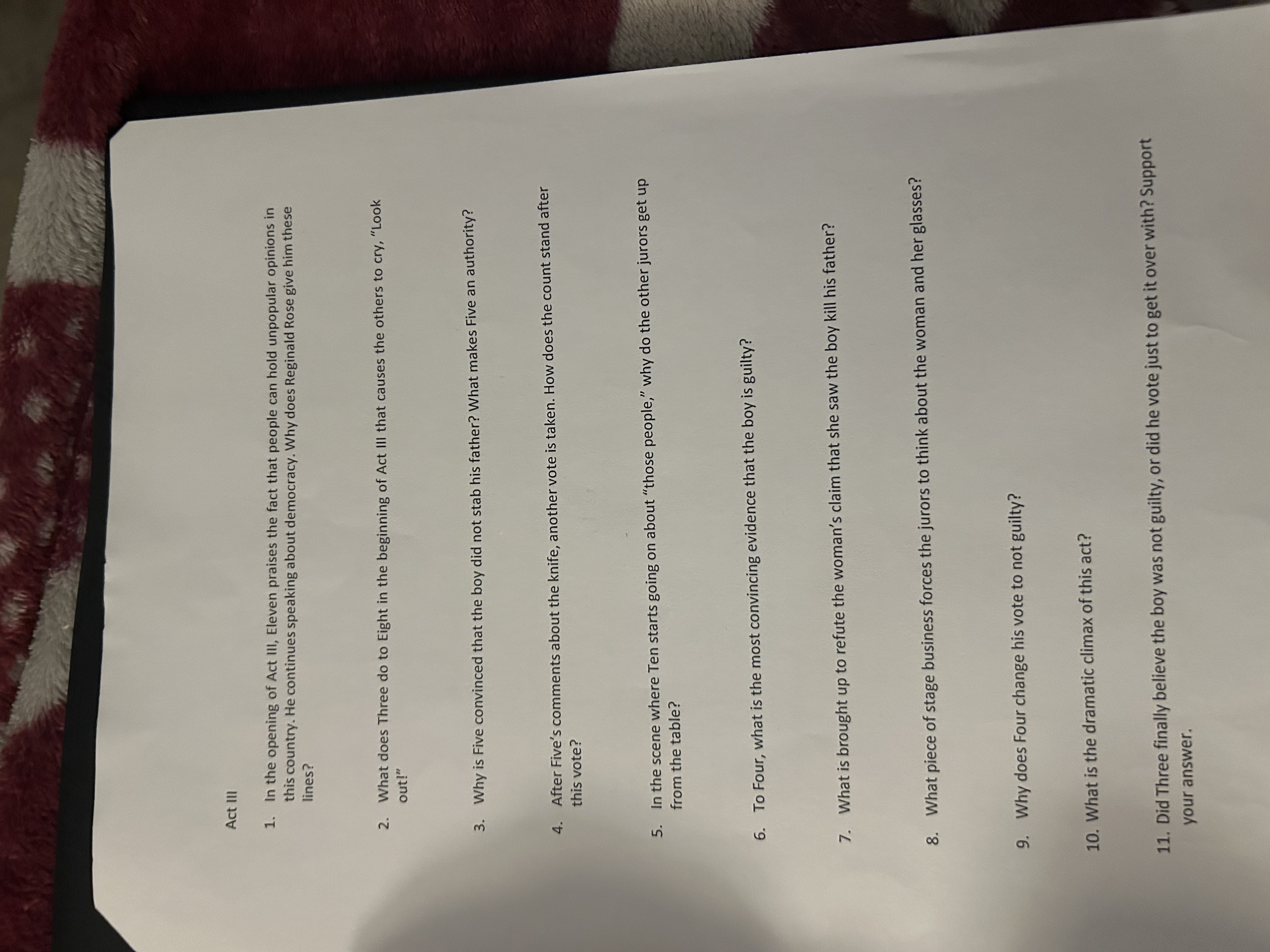1. In the opening of Act III, Eleven praises the fact that people can hold unpopular opinions in this country. Why does Reginald Rose give him these lines? 2. What does Three do to... 1. In the opening of Act III, Eleven praises the fact that people can hold unpopular opinions in this country. Why does Reginald Rose give him these lines? 2. What does Three do to Eight in the beginning of Act III that causes the others to cry, 'Look out!'? 3. Why is Five convinced that the boy did not stab his father? What makes Five an authority? 4. After Five's comments about the knife, another vote is taken. How does the count stand after this vote? 5. In the scene where Ten starts going on about 'those people,' why do the other jurors get up from the table? 6. To Four, what is the most convincing evidence that the boy is guilty? 7. What is brought up to refute the woman's claim that she saw the boy kill his father? 8. What piece of stage business forces the jurors to think about the woman and her glasses? 9. Why does Four change his vote to not guilty? 10. What is the dramatic climax of this act? 11. Did Three finally believe the boy was not guilty, or did he vote just to get it over with? Support your answer.

Understand the Problem
The question is asking for interpretations and analyses of Act III from a specific play, likely 'Twelve Angry Men' by Reginald Rose. Each question prompts a close examination of character motivations, key plot points, and thematic elements.
Answer
1. Democracy theme, 2. Three lunges at Eight, 3. Knife fight knowledge, 4. Vote 6-6, 5. Prejudice isolation, 6. Eyewitness testimony, 7. Glasses point raised, 8. Eye rubbing gesture, 9. Doubts woman's sight, 10. Three's concession, 11. Overwhelming doubt.
- Reginald Rose gives Juror Eleven these lines to emphasize the importance of democracy and freedom of speech, highlighting the play's central themes. 2. Three aggressively lunges at Eight, causing the others to shout, 'Look out!' 3. Five is convinced due to his familiarity with knife fights, suggesting the stab wound was inconsistent with the boy's height and capabilities. 4. After Five's comments, the vote switches to 6 guilty and 6 not guilty, reflecting a shift towards doubt. 5. The jurors get up from the table to show their disapproval and to isolate Ten until he recognizes his prejudice. 6. To Four, the woman's eyewitness testimony is the most convincing evidence. 7. The fact that the woman wore glasses, which she did not have on during the supposed observation. 8. A juror rubbing their eyes focuses attention on the woman's need for glasses, making her testimony suspect. 9. Four changes his vote because the unreliability of the woman's eyesight is made clear. 10. The dramatic climax occurs when Three is isolated as the last holdout, eventually conceding. 11. Three votes not guilty not because he truly believes it, but because he realizes he can no longer argue against the overwhelming doubt.
Answer for screen readers
- Reginald Rose gives Juror Eleven these lines to emphasize the importance of democracy and freedom of speech, highlighting the play's central themes. 2. Three aggressively lunges at Eight, causing the others to shout, 'Look out!' 3. Five is convinced due to his familiarity with knife fights, suggesting the stab wound was inconsistent with the boy's height and capabilities. 4. After Five's comments, the vote switches to 6 guilty and 6 not guilty, reflecting a shift towards doubt. 5. The jurors get up from the table to show their disapproval and to isolate Ten until he recognizes his prejudice. 6. To Four, the woman's eyewitness testimony is the most convincing evidence. 7. The fact that the woman wore glasses, which she did not have on during the supposed observation. 8. A juror rubbing their eyes focuses attention on the woman's need for glasses, making her testimony suspect. 9. Four changes his vote because the unreliability of the woman's eyesight is made clear. 10. The dramatic climax occurs when Three is isolated as the last holdout, eventually conceding. 11. Three votes not guilty not because he truly believes it, but because he realizes he can no longer argue against the overwhelming doubt.
More Information
Juror Eleven's lines highlight the democratic process, a core theme of 'Twelve Angry Men.' The play uses character dynamics to explore justice, bias, and the power of reasonable doubt.
Tips
Avoid assuming the action of one juror reflects the group; consider motivations individually.
Sources
- Juror Eleven praises the fact that people can hold unpopular opinions - gradesaver.com
- Drama Unfolds: Analyzing Juror Dynamics in Twelve Angry Men Act 3 - coursehero.com
AI-generated content may contain errors. Please verify critical information